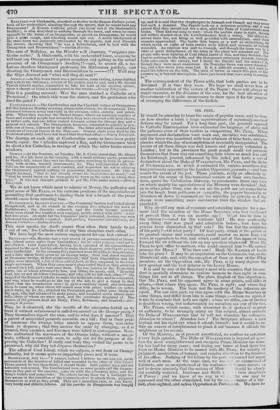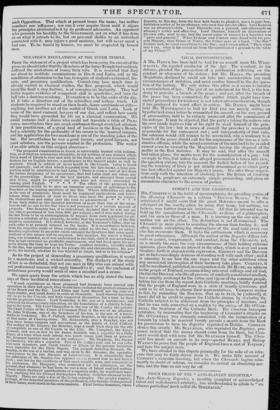MR. PEEL.
IT would be amusing to trace the origin of popular error, and to show on how slender a basis a large superstructure of commonly-received fictions may be raised. For a long time past, the journals opposul to Catholic Emancipation have exhausted the language of abuse and the patience even of their readers in vituperating Mr. PEEL. Wilutt argument and declamation were worn out, narrative was substituted, and the town was inundated with true relations of false facts, and pro- phecies which the day of accomplishment invariably disappointed. The source of all these things was well known and properly estimated in London ; but in the provinces the good people could not persuade themselves that there was not something done where so much was said. An Edinburgh journal, influenced by this belief, put forth a sort of declaration about the Duke of WELLINGTON, Mr. PEEL, and the Duke of CUMBERLAND, in which it embodied the various assertions that had previously appeared in the London Opposition journals ;—and here comes the cream of the jest. Those journals, really or affectedly ig- norant of the origin of this translated version of their own lueuhra- tions, quote the Caledonian Mercury, to corroborate those very tales on which mainly the speculations of the Mercury were founded! And, as in other jokes those who do not see the point are yet compelled to join the laugh • from politeness or sympathy, the papers favourable to Ministers sit down to comment on the unreality as gravely as if the dream were something more substantial than the shadow that ori- ginated it. Why should any man of common understanding imagine for a mo- ment that the situation of the Home Secretary was less confirmed at present than it was six months ago? What has he done in the interim ?—voted for the Catholic bill ! He was confessedly every thing that was great and admirable before; how have his powers been diminished by that vote ? He has lost the confidence of his party !—Of what party ? Of that party, which at the period of its greatest vigour and excitement, could muster no more than ISO votes in opposition to 360, and which could not at this moment bring forward the 80 without the 100 on any question whatever, Were Mr. PEEL to quit office to-morrow, who could succeed him ?—He cannot manage the House Who then can ? Shall Mr. SADLER of Leeds take his place ? It may be an imputation on the Commons, but, on the Ministerial side, and, with the exception of three or four of the Whig members on the Opposition side, Mr. PEEL is by many degrees the best speaker and the best debater in the Lower House. It is said by one of the Secretary's most able enemies, that his con- duct is specially obnoxious to censure because he does right in some things but not in all things. The plain English of this objection is, that Mr. PEEL and his opponent agree in some points, and differ in others,—that where they agree, Mr. PEEL is right; and where they differ, he is wrong. The logic and the modesty of the inference are equal. For our own part, we also agree with the Home Secretary in sonic things, and differ from him in some things ;—where we agree, it is fair to conclude that both are right; where we differ, one of the two is doubtless wrong, but unfortunately we ourselves are one of the two. The Times, which seems, with reverence be it spoken of so great an authority, to be strangely astray on this subject, almost entreats the Duke of WELLINGTON that he will not abandon his colleague. Abandon to whom ? Abandon how ? The Scripture advises a man to pluck out his right eye when it offends himself; but it would be ra- ther an excess of complaisance to pluck it out because it offends his neighbour or his enemy. Of the Ministry, as at present constituted, we confess we entertain a very high opinion. The Duke of WELLINGTON is beyond all ques- tion the most straightforward and energetic Prime Minister the coun- try has had for many years ; and during our times at least there has been no Home Minister to be named with Mr. PEEL, for solidity of judgment, moderation of temper, and regular attention to the business of his office. Judging of the future by the past, we cannot but augur well of such men. At the same time, we are nit so enamoured of Cabinets, nor so inexperienced of the weakness of human nature, as not to desire sincerely that the actions of Mim• • •: should be closely but candidly watched. Insolence and Sloth a: • • twin daughters of Power ; and we know of no way in wl the one may be repressed and the other stimulated, but by the illa.1:enance of a vigi- lant, clear-sighted, and active Opposition in Parl"--icnt. We have no such Opposition. That which at present bears the name, has neither numbers nor influence ; nor can it ever acquire them until it abjure the principles attributed to it by its professed advocates. An opponent who grounds his hostility to the Government, not on what it has done or on what it intends to do, but on personal dislike. to an individual connected with it, may injure a good minister, but will never mend a bad one. To be feared by knaves, we must be respected by honest men.



















 Previous page
Previous page